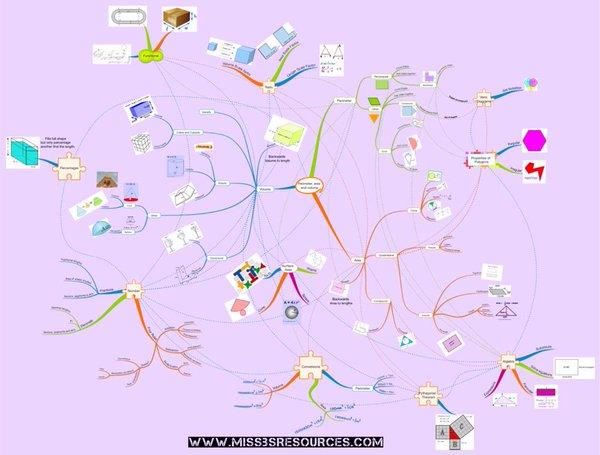Planning Ahead

When planning for a new topic it's important to look at the bigger picture and the journey you may want to take your class on with a topic. I say may because more often than not our best laid plans change and for good reason, however being aware of what they may change to makes it easier to manage. Personally, to do this I used to make lists and sub list of list which then had their own sub lists, as you can see I found this helpful but it sometimes got confusing. Michelle Dunning who is at Acklam Grange School as KS4 lead in maths introduced me to using mind maps to help plan out a topic. This soon speed up my process and helped the connections make sense.
For example my medium term plan for perimeter, area and volume was the below mind map.

When teaching we teaching the same a topic area for all students at different stages of their learning planning out the challenge supports us as team. Providing us with chance to investigate and collaborate both teaching ideas and level of difficulty of work, are we challenging the students enough? Often just starting out with a title and then brain storming the key themes is a great starting point to provoke many discussions. This year we are lucky enough as leadership of the maths (HOD, KS3, KS4, LP and Data) to be given gain time to work on and develop a progressive scheme of work, which continually builds on the previous learning. I feel the students are finally getting it, they can see the links being made and we aren’t allowing for backwards steps. For example when teaching perimeter, area and volume we would teach with fractions and decimals both non-calculator and calculator lessons and heavily tie in forming and solving equations, even scale factors, problem solving and reasoning tasks.
So what is the purpose of this post…. The message is when planning for a new topic look at the bigger picture. Otherwise if you don't have an idea of the journey you may go on it could be a pretty segmented ride. We need students to be mathematically fluent and have the ability to reason mathematically. In order to do so they to be able to draw upon their mathematical knowledge from any topic area. Planning out the connection and links between topics doesn't mean you can't deviate in lessons and or think of a different path and journey as each class and student responds to topics differently. Planning though does help you to consider any misconceptions students may have. It also both allow the students an opportunity to use their bank of mathematical knowledge to create a deeper understand and creates a clear focus for stretching and challenging concepts you may wish to include within this module.
For example here is my starting point for angles. (I'm finding algebra throughout is a continual trend.)
Types
- Naming
- Estimating
- Measuring
- Bearings
- Labeling
Polygons
- Naming Shapes
- Properties of polygons
- Interior/exterior angles
- Relationships and formulae
- Problem solving
- Sum of angles
- Investigate connection
with triangles.
- Investigate connection
- Triangles and Quadrilaterals
- Geometrical reasoning
- Isosceles triangles
- Geometrical reasoning
Lines
- Straight line
- Labeling
- Perpendicular
- Right angle
notation
- Right angle
- Algebra
- Perpendicular
- Labeling
- Around a point
- Vertically opposite
- Parallel
- Geometrical Reasoning
- Problem solving
(Inc. triangles & multiple lines). - Bearings (Interior angles)
Circle Theorems
- Tangent and radius perpendicular
- Pythagoras' Theorem
- Trigonometry
- Tangent and radius perpendicular
- Geometrical Reasoning
- Link back to isosceles triangle
(Radius)- Parts of a circle
- Link back to isosceles triangle
I find it useful when planning with peers to take this model to help form challenge questions and make sure the students end up where I need them to be.
Tags: Maths Resources, Planning, New GCSE , NQT Advice
Comments (2)
-
Guest - Faruk
Planning is very important for success. If you want to complete a task successfully at first your need a good planing. Thank you so much for your great blog.
0 Like -
Guest - Parp
After long time later today i take a fantastic web. It is not only important but also very informative. I am so satisfy for this website. Keep your work.

 0 Like
0 Like







Leave your comments
Login to post a comment
Post comment as a guest